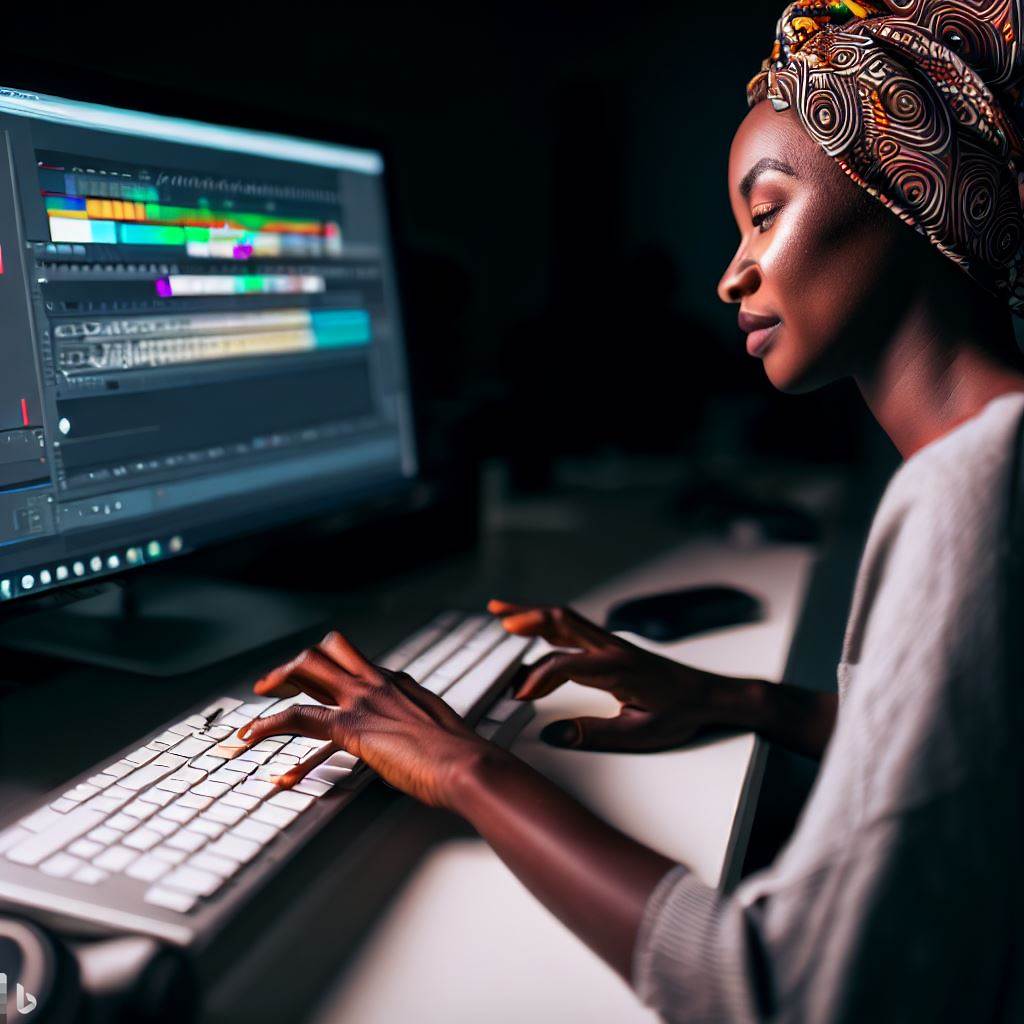Introduction
As a freelancer, your portfolio is your ticket to securing more gigs. It’s a collection of your work samples, skills, and expertise. Having a portfolio is important because it showcases what you can do and helps potential clients evaluate whether you’re a fit for their project.
In this guide, we’ll show you how to build a portfolio that stands out and matches the needs of your target clients. We’ll also share tips on how to make your portfolio more appealing and effective.
So, whether you’re a writer, graphic designer, photographer, or any other type of freelancer, this guide is for you. Let’s dive in and get started on creating a killer portfolio!
Defining Your Niche
Defining Your Niche is an essential step for any freelancer looking to build a portfolio in Nigeria. Knowing your niche and working within it gives you an edge over generalists.
It helps you to focus and specialize in a particular area. Here are some reasons why finding your niche is important:
1. You’ll stand out
When clients are looking for freelancers to work with, they’re most likely to go for those who specialize in their area of interest. You’ll be perceived as an expert and someone who understands their business and its needs.
2. You’ll gain more experience
Working within a niche allows you to gain experience and knowledge in a particular area. This gives you more credibility and authority within that field.
The more you specialize, the more you hone your skills, and the more valuable you become.
3. You’ll have more of a focus
Being a jack-of-all-trades might seem like a great idea, but it can lead to confusion, both for you and your clients.
By focusing on a particular niche, you’ll have greater clarity and be able to communicate your expertise more effectively.
So, how can you identify your niche?
1. Consider your interests and passions
Your passion is a great starting point for finding your niche. Think about your interests and what you love doing, and then figure out if there’s a market for it.
2. Look at your skills and experience
Your skills and experience should also be considered when identifying your niche. What are you good at, and what experiences have you had that could be monetized as a freelancer? Identify your strengths and build on them.
3. Research the market
Research is crucial when it comes to identifying a niche. Look at the market, and find out what’s in demand. This will help you to determine if there’s a viable market for your chosen niche.
Some examples of niches in Nigeria include:
1. Writing and content creation
This niche involves creating written content for websites, blogs, and social media platforms. It includes copywriting, blogging, technical writing, and content strategy.
2. Graphic design
Graphic design is a popular niche in Nigeria. It includes designing logos, websites, social media posts, and marketing materials.
3. Web design and development
Web design and development is a technical niche that involves creating and maintaining websites. It includes front-end and back-end development, website design, and website maintenance.
4. Social media management
Social media management is another niche that’s gaining popularity in Nigeria. It involves managing and creating content for social media platforms like Facebook, Instagram, and Twitter.
In short, finding your niche is critical to building a successful portfolio as a freelancer in Nigeria. It allows you to focus on your strengths, stand out from the competition, and gain more experience and credibility.
Remember, finding your niche is a process, so be patient and keep experimenting until you find the perfect fit for you.
Read: Freelance Job Trends: Nigeria’s Digital Marketplace
Choosing Your Showcase Pieces
As a freelancer, your portfolio is your most valuable asset. It is the key to unlocking new clients and securing more projects, and therefore it’s crucial to spend time building and perfecting it. Let’s discuss how to choose your showcase pieces.
What showcase pieces are?
- Showcase pieces are the best examples of your work that demonstrate your skills and expertise.
- They showcase the quality of your work and demonstrate what you can do for potential clients.
- Showcase pieces are the perfect opportunity to display your skills and stand out from the crowd.
Importance of showcasing your best work
- Showcasing your best work is crucial because it demonstrates your skills and expertise to potential clients.
- It’s a way of marketing yourself and setting yourself apart from other freelancers.
- High-quality showcase pieces show that you are trustworthy and professional.
How to choose your showcase pieces
- Choose pieces that demonstrate your most refined skills and abilities related to the services you are offering.
- Choose showpieces that best represent the type of work you want to be hired for.
- Showcase pieces should be easy to understand and visually appealing to potential clients.
- Make sure your showcase pieces represent your most recent work.
- Showcase pieces should be varied, demonstrating your ability across a range of different projects or styles.
- Consider including a brief description of each showcase piece, including the client, project type, and your role in the project.
Remember, your portfolio is the key to securing new clients and projects as a freelancer. Spend time carefully selecting your showcase pieces, demonstrating your best work, and showing potential clients what you can offer.
By building a strong portfolio with high-quality showcase pieces, you’ll be well on your way to thriving as a successful freelancer in Nigeria.
Read: Understanding Tax for Freelancers in Nigeria: A Guide
Creating and Designing Your Portfolio
As a freelancer in Nigeria, creating and designing a professional-looking portfolio is crucial in showcasing your skills and attracting potential clients. Here are some tips on how to design a portfolio and some examples of portfolio websites and platforms to consider:
Importance of having a professional-looking portfolio
- First impressions matter, and a well-designed portfolio can make a great first impression on potential clients.
- A portfolio serves as a showcase of your skills and previous work experience, allowing clients to see your range and depth of expertise.
- A professional-looking portfolio can set you apart from other freelancers and increase your chances of being hired.
- Your portfolio can also serve as a reference point for your work and a way to track your growth as a freelancer.
How to design a portfolio
- Choose a clean and simple layout that is easy to navigate.
- Use high-quality images and content that highlights your skills and work experience.
- Organize your portfolio into categories that are easy to understand, such as by skills, type of work, or industry.
- Showcase a variety of work samples, including both completed projects and works in progress.
- Include client testimonials and feedback to showcase your professionalism and reliability.
- Make sure your contact information is easy to find and include links to your professional social media profiles.
Examples of portfolio websites and platforms in Nigeria
- Behance – a platform for creatives to showcase their work and connect with clients.
- TalentSQR – a Nigerian freelancing platform that connects freelancers with clients.
- Upwork – an international freelancing platform with opportunities for Nigerian freelancers.
- Toptal – a platform that connects top freelancers with clients in various industries.
Remember that your portfolio is an extension of yourself and your brand as a freelancer. Take the time to design and showcase your skills in the best possible way. Happy portfolio building!
Read: Successful Freelancer Profiles: Stories from Nigeria

Showcasing Your Portfolio
The final step in building a successful portfolio as a freelancer in Nigeria is showcasing your work. Here are some tips for doing so:
Importance of promoting your portfolio
- Without promotion, potential clients may never see your work.
- Market your portfolio to build your credibility and attract new clients.
How to showcase your portfolio to potential clients
- Choose a clean and easy-to-navigate website or platform to showcase your work.
- Organize your portfolio according to your skills and the services you offer.
- Include clear descriptions with each project to give potential clients insight into your thought process.
- Make sure your contact information is displayed prominently to encourage clients to reach out to you.
Tips for increasing visibility and exposure
- Use social media to your advantage by sharing your work and interacting with potential clients.
- Collaborate with other freelancers and companies to expand your network and reach.
- Attend networking events and conferences to meet potential clients and showcase your work in person.
- Ask for testimonials and referrals from satisfied clients to build your reputation and promote your work.
Remember that showcasing your portfolio is an ongoing process. Regularly update your portfolio and make sure it reflects your best work. By following these tips, you can increase your visibility, attract new clients and establish a successful career as a freelancer in Nigeria.
Read: Freelancing in Nigeria’s Creative Industries: Insights
Explore Further: Why a Strong Portfolio Matters for Freelancers in Nigeria
Keeping Your Portfolio Updated
Your portfolio is a reflection of your skills, creativity, and professionalism. As a freelancer, your portfolio is your calling card and one of your most important marketing tools. However, creating a portfolio is not enough; you need to keep it updated regularly.
Importance of Updating Your Portfolio
- Keeps your portfolio fresh & relevant
- Demonstrates your growth & development as a professional
- Shows potential clients that you are active and always improving
- Ensures that your work is up-to-date and relevant to current trends and industry standards
How Often to Update Your Portfolio
Updating your portfolio is a continuous process. As a general rule, you should aim to add new work to your portfolio every month or two. However, this is not a hard and fast rule, and the frequency with which you update your portfolio depends on various factors, including:
- The volume of your work
- The type of projects you undertake
- The extent of the changes or improvements that you make to your work
Remember, quality over quantity always applies in building and updating your portfolio. Don’t feel pressured to include every single work you have done; instead, include only your best and most representative work.
Tips for Keeping Your Portfolio Fresh and Relevant
- Organize your portfolio by categories and keep it simple and easy-to-navigate
- Showcase your latest and most relevant work prominently, but don’t ignore your older work, especially if it’s still relevant
- Include project details such as client names, industry, and project objectives
- Highlight the challenges you encountered and how you overcame them or on how you achieved particularly good results
- Consider sharing why you were particularly passionate for a project and what you learned from it
- Ask for feedback and evaluations from your clients and include them on your portfolio as testimonials
- Regularly review and evaluate your portfolio to ensure that it is up-to-date and relevant in your chosen field
- Don’t forget to optimize your portfolio for SEO and make sure you use the right keywords to help potential clients find you
Remember that your portfolio is more than just a collection of your work samples; it is also a representation of your brand and your professional identity.
Make sure that you keep your portfolio consistent with your personal brand, and present yourself in a way that is honest, authentic, and professional.
In essence, keeping your portfolio updated is essential for any freelancer. It shows that you are serious about your craft, that you are continuously growing and improving as a professional, and that you are committed to meeting the demands and trends of your industry.
Invest the time and effort in keeping your portfolio fresh and relevant, and you will reap the benefits of better clients and exciting projects.
Conclusion
Building a portfolio as a freelancer in Nigeria is crucial for showcasing your skills and attracting clients. It is important to remember that your portfolio should be professional, easy to navigate, and visually pleasing.
Some tips for building a successful portfolio include starting with the basics like identifying your niche and creating a personal brand. Be sure to include relevant samples of your work, highlight your strengths, and keep your portfolio up to date.
Another important aspect to consider is to get feedback from others, especially fellow freelancers or clients. This can help you improve your portfolio and overall work quality.
Remember that a strong portfolio is an ongoing process and should be viewed as a way to continually market yourself as a freelancer in Nigeria.
As you gain more experience and add new projects, be sure to update your portfolio regularly to reflect your growth and skills.
Generally, having a well-crafted portfolio is crucial for freelancers in Nigeria to position themselves as leaders in their respective fields and ultimately attract the right clients.
With these tips in mind, go ahead and start building your portfolio today!




